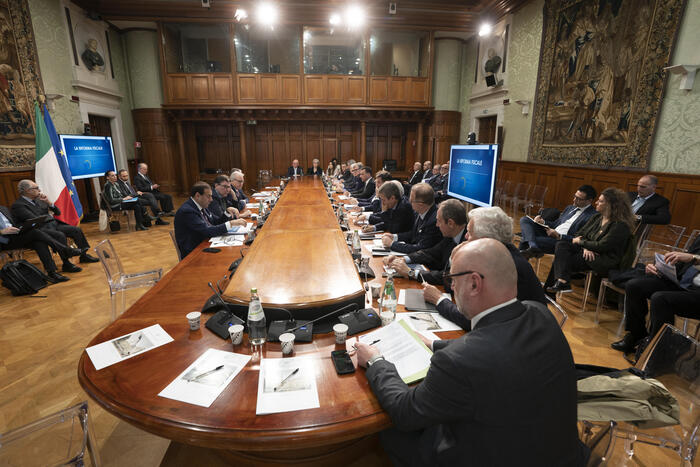The second day of discussions between the government and the social partners
began shortly after 9.30 am
on tax reform.
After the trade unions, met yesterday, today the representatives of companies and professional orders are summoned to Palazzo Chigi starting from Confindustria, Abi, Confapi, Confimi, Confartigianato, Cna, Casartigiani, Cia, Confcommercio, Confesercenti, Federdistribuzione, Federterziario, Confeservizi, Coldiretti, Confagricoltura, Copagri.
Afterwards, from 11, it will be the turn of Ania, Ance, Confedilizia, Alleanza Cooperative, Confcooperative, Unicoop, Cndcec (Accountants), National Council of the Order of Labor Consultants, Confprofessioni, Assoprofessioni, ANTI (Italian Tax Lawyers).
The government is represented by the Minister of Economy, Giancarlo Giorgetti, by the Deputy Minister, Maurizio Leo and by the Undersecretary to the Prime Minister, Alfredo Mantovano.
"In comparison with today's government, Confesercenti
's keywords
are: stop the era of advances; tax on e-commerce for large platforms, necessary to rebalance competition, which is not present in the delegation - and this is our opinion of primary importance -; tax benefits also for the lowest incomes; abolition of IRAP, the effects of which only benefit large companies and risk penalizing mainly SMEs of commerce and services", comments Nico Gronchi, vice president of Confesercenti, in margin of the table on the tax reform at Palazzo Chigi.
And he underlines: "Let's not forget that Italy is not made up only of micro and large enterprises but also and above all of small and medium-sized enterprises".
The tax reform is important to reduce the bureaucratic pressure on agricultural enterprises and enhance the environmental role of Italian agriculture but also to support the development of alternative energies starting from biogas and the country's energy self-sufficiency.
This is what the president of
Coldiretti affirms
Ettore Prandini on the occasion of the meeting at Palazzo Chigi convened by the Government on the draft enabling law for the reform of the tax system.
"The rationalization and reduction of bureaucratic and administrative obligations - underlines Prandini - introduces a new relationship between business and the tax authorities, freeing up resources for production but also reducing possible disputes, also in order to encourage generational turnover in agriculture that can make use of a modern tax and fiscal system".
In reviewing the application system of excise duties and other taxes on production and consumption, continues the president of Coldiretti, "
it is also important to provide a system that takes into account the gradual process of technological transition of machinery and vehicles used in the agricultural sector, especially as regards the development of agro-energy deriving from biomass, starting from biogas and biomethane.
The decision to subject the income deriving from agricultural cultivation and breeding activities to taxation on a cadastral basis, which contribute to the protection of the environment and the fight against climate change, is also positive". But "the decision - explains Prandini - to make the tax treatment of innovative agricultural activities homogeneous with respect to the typical taxation system of the agricultural sector, extending it to agricultural cultivation activities even if exercised on surfaces without a cadastral income".
"We are here to listen, but we will also make a proposal on the issues of urban regeneration and urban redevelopment. The tax reform must provide benefits for those who invest and for those who want to improve our cities".
This was stated by the president of ANCE,
the National Association of Building Builders
, Federica Brancaccio, entering Palazzo Chigi for discussions with the government on the tax delegation.
"It is a unique opportunity", according to Brancaccio, "we are in a very important moment, we hope that in this enabling law there will be room for private interventions to improve our cities".
In general, the principles of the tax reform "are all acceptable, because we are talking about simplification and we are talking - as we have been talking about for years - about a more friendly tax system, closer to businesses and citizens. Obviously then it will be the implementing decrees, which we hope to be able to participate with real and operational consultations which will then state these principles in the shortest possible time".
"An implementation of the enabling law is good, which aims to pursue an overall reform of the tax system with the objectives of stimulating growth through the reduction of the tax burden, of combating evasion and avoidance, of simplifying obligations and of strengthening legal certainty. The complexity of the construction site that is opening calls for the adoption of a planned and structured method of confrontation with the social partners".
This was stated by Giovanni Da Pozzo, vice president of
Confcommercio
, on the occasion of the Palazzo Chigi meeting on tax reform.
"In fact, the prospect of an overall reform of the Irpef emerges, under the banner of the confirmation of the principle of progressiveness and with objectives of horizontal equity, acting on the fronts of the reduction of rates and income brackets, of a no-tax area without disparity between employees and pensioners and also by pursuing an extension of the flat tax".
"As regards business income - added Da Pozzo -, we deem important the choices - both in terms of Irpef and in terms of Ires - which intend to favor the reinvestment of profits in the company, rewarding investments in innovation and the construction of new occupation.However, the process of gradually overcoming the Irap must be clarified,
accompanied by recourse to an IRES surcharge in order to guarantee the financing of the health service.
While, as far as VAT is concerned, the rationalization interventions should not, in our opinion, translate into an overall increase in indirect taxation on goods and services".

